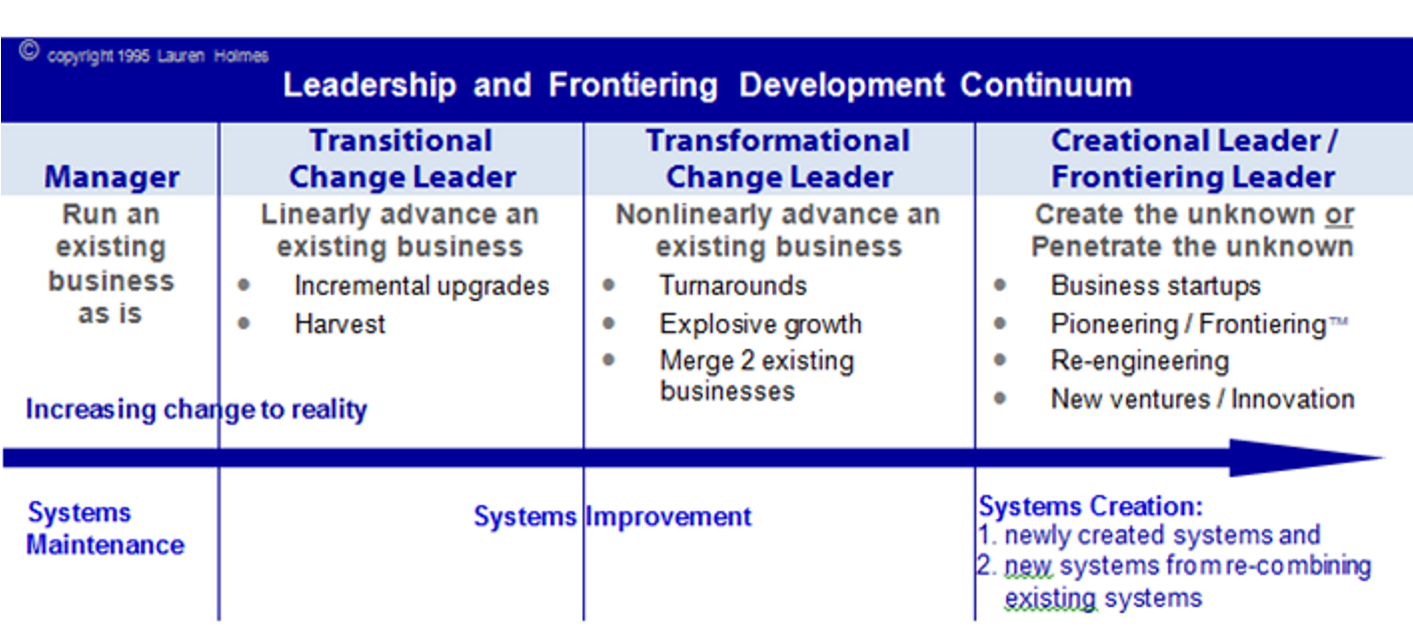The person who can ‘frontier’ will always be the leader
Most people are fearful of venturing into the unknown. Yet a world of accelerating change is now the norm. We are increasingly bombarded with unknowns. We look to our leaders to buffer us from their assault. We expect our leaders to get us through safely, quickly, efficiently, and painlessly.
The person with the expertise for penetrating the unknown will always be the leader. This will be true whether or not that person has all of the wonderful capabilities promoted by today’s leadership pundits. And it will be increasingly true as the unknowns continue to multiply.
WHAT IS FRONTIERING?
Penetrate the unknown and Create the unknown
Frontiering™ is a term I coined to label finesse in scaling new frontiers. It encompasses expertise for quickly, safely, and expertly
(a) penetrating new or unknown territory or
(b) creatively bringing the new or unknown into existence.
Frontiering™ is the drive to fearlessly forge futures in the face of the unknown and the unknowable. Frontiering™ expertise equips us to transcend and triumph over unknowns of every specification.
FRONTIERING IS THE NEW LEADERSHIP
Frontiering™ will become the new leadership. In fact, I would like to suggest that there will be no leadership without frontiering? As change continues to accelerate to become the status quo, frontiering™ will quickly exceed leadership as the most prized skill. The demand for all of us to take risks, to venturesome, to adapt in the face of novel challenges, and to become opportunistic and innovative will rise. The ability to thrive in and exploit unknown frontiers will become the most sought-after skillset of this millennium:
Frontiering acumen will determine competitive advantage. Frontiering will determine the next generation of winners and losers, individually and corporately.
A 2014 REDEFINITION OF LEADERSHIP
Over the decades of the evolution of the concept of leadership, there have been a plethora of definitions for ‘leader’ and ‘manager’. These past stages of evolution dilute and color today’s understandings. Clarity for the target expertise has dissipated. Frontiering expertise provides an easy differentiator.
Managers manage what exists. Leaders bring the new into existence. Managers run existing organizations and territories. Leaders penetrate new territories. Leaders advance, transform, and create new human systems. Leaders lead people into new territories or bring new systems into existence.
If you are simply repeating what was done before, leadership is not required. If there is no change in reality, leadership has not occurred. The magnitude of change in reality is the measure of leadership strength. Therefore, the degree of frontiering is the measure of leadership impact.
THE NEW leadership DEVELOPMENT CONTINUUM
As the below figure indicates, the growth in frontiering expertise defines the development continuum from manager to leader. A leadership development continuum emerges based on the degree of frontiering applied. The frontiering-based leadership development continuum will progress from
- a manager running an existing organization, to
- a transitional change leader adding linear advancement to the organization, to
- a transformational change leader adding nonlinear change to an organization, to
- those leaders who have mastered the unknown, either a creational leader or a frontiering leader or both. Respectively, these individuals either (a) bring the new and unknown into existence or (b) penetrate new or unknown territory.

This leadership-skill development continuum is identical to the process for growing individuals into frontiering experts. The definition for leader and frontiering expert are therefore the same. There is no need for leadership if you are standing still.
Secondly, the above continuum also demonstrates another dimension to the progression from manager to leader. Creativity. Systems maintenance for which no change is made, gives way to increasing systems advancement in which linear then nonlinear changes are made. And finally one progresses to systems creation – usually by re-combining existing systems to create new systems.
Thirdly, as managers advance along the leadership development continuum, their ability to impact and advance reality increases. The ability to change reality is dependent upon the ability to change beliefs. The greater the change in reality required, the greater the commensurate change in follower beliefs that the leader must instill.
MARK THE BIRTH OF THE NEW DEFINITION
I propose we draw a line in the sand to release all past definitions of leader and manager in favor of this 2014 clarity and necessity. The person penetrating the unknown with passion, expertise and, yes, especially addiction, will always be the leader.
REACTIVATE INNATE FRONTIERING
The exciting news is that, as a successful species, human beings are born with frontiering drives and skills. In childhood, we are all in a perpetual state of frontiering to learn everything that we must in order to survive and integrate successfully into a complex and ever-advancing world. Most children experience surprising success in facing, negotiating, mitigating, and surmounting a deluge of unknowns in their first five years of life.
Unfortunately, our cultures and institutions curtail the development of our innate frontiering drives and expertise by pressuring us into more linear and logical modes of operation. Most children begin to find it unsafe to frontier once they enter the school system around the age of five. Our cultures make unsafe the trial-and-error required to succeed in new territory, for example. Failure means you are a failure, not the frontiering expert who will bring new knowledge, experience, and expertise to the next trial and the next and the next.
Secondly, the pressure to use linear procedures that seldom work in novel situations is another example of cultural interference. The widespread pressure to adhere to linear business plans and project plans are illustrations. Thirdly, sensationalizing media punish rather than support frontiering™ missions which fail. Consequently, millions of dollars must be wasted on making experiments and forays into the unknown guaranteed to be successful before they are begun.
If it were not for the fear of public censure, quick, inexpensive experiments which might fail could accelerate progress. Members of the scientific community are allowed often hundreds of opportunities to fail as they scale new frontiers. The CEO of a publicly-held company may discover that one failure is often his or her last.
As a successful species, mechanisms have evolved which favor and promote frontiering. These include addictive drives pulling us into new territory and creation – the essence of agile adaptivity. The more you comply with these drives, the more you want to comply in the future.
Consequently, we need only increase our daily frontiering activity to launch a frontiering way of life. There are biological mechanisms to perpetuate and increase one’s addiction to frontiering. Voilá! Both the leadership and innovation shortages are solved in an entirely unprecedented way.
- Could the human race not decide to revise our cultures to free frontiering in everyone?
- What could we accomplish if everyone reactivated the innate frontiering expertise we demonstrated in childhood?
Perhaps this cultural conversion will begin with the pressures of corporate competition. Those companies which choose to make frontiering™ safe for their employees will undoubtedly prevail in the future. Career success will continue to favor those who scale new frontiers. If we examine the most successful careers, it is apparent that frontiering already exceeds leadership as the most sought-after aptitude, expertise, and skillset. Yet they are one and the same:
Leadership for this millennium is defined by frontiering. Leadership is now, by definition, frontiering.
FURTHER READING
The Biologically Maximized Corporation:
The New Corporate Maximums: Biology – the competitive advantage no one foresaw
The same process used to maximize individuals may also be applied to maximizing any human system – families, companies, countries, or humanity. Once employees master the maximization process for themselves, organizations can flatten, the leadership load will lighten, and the innovation and performance quotients will increase.

As CEO of Frontiering.com, Lauren Holmes designs customized companies, projects, jobs, and career and company strategies which will enable people to biologically maximize to achieve goals and impact at their maximum or beyond. Lauren is a biological anthropologist who helps people and companies to superachieve by extending their capabilities with surrounding biological infrastructure with which humans have evolved to partner. See LaurenHolmes.com for more about Lauren’s books and articles.
